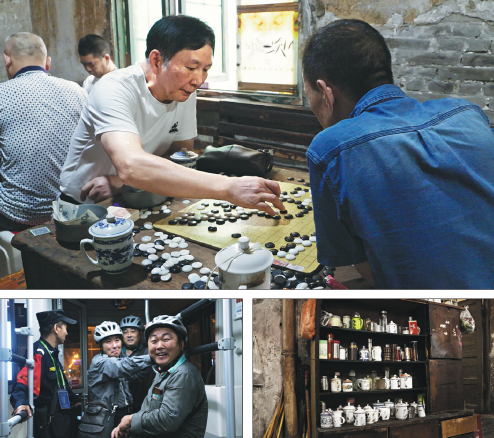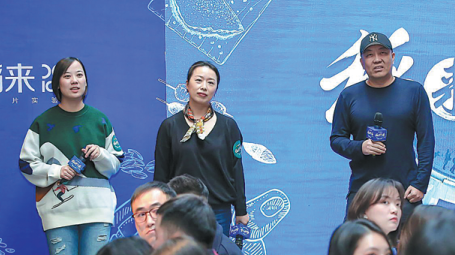Living in real time
Old culture mixes with modernity to provide a fascinating insight, Fang Aiqing reports.

The second season of a documentary revealing how Chinese people cope with modern life and its challenges in their own words has been released on Tencent's video platform. The first season of the Sino-Japanese production, 72 Hours China, got 250 million clicks on the platform in 2018.
The 13 episodes for this season plunge headfirst into social topics-intergenerational relations for example. It's a topic the audience, especially the younger generation, is fascinated by and wants to discuss, said chief director Zhang Xuejiao at a meeting with fans in Beijing on Dec 23.
Some episodes highlight local public spaces that represent the hidden but culturally vital aspect of modern Chinese cities, like a fabric shop in Beijing's hutong (alleyway) area and a bathhouse in the northeastern city of Shenyang, Liaoning province.
Emerging, offbeat venues, such as a paid study room in Hefei, Anhui province, and a space capsule hostel in Hangzhou, Zhejiang province, are introduced to reflect the change in youth culture.
What people do at these places also indicates the stress that modern city-dwellers are burdened by and their state of mind.
In the first episode, a trio of old friends sits around a classic square table, each with a cup of tea, chatting wildly.
"He's done grand businesses like installing elevators to the Himalayas and building a cover for the Pacific. His greatest project ever was polishing the moon," one man says as he points to another who bursts out laughing.
The conversation happened at southwestern Chongqing's Jiaotong Teahouse, a traditional establishment that has been running for more than 30 years. The retired workers have been regular visitors during this time and come here every day to chat and joke.
Amid the city's modernization, more than 2,000 traditional teahouses have vanished over the last century. But Jiaotong Teahouse survives and thrives. It has been identified as a "specimen" of the original local lifestyle and has become an online hit.
"Tourists occupy the space in the afternoon, but in the morning it's still part of local daily life," says Li Jie, the producer.
The documentary captured what was going on at the teahouse over three days in June.
Early in the morning, when the clock just hits 6 and the teahouse opens for the day, regular guests come in. They are mainly elderly and middle-aged residents who used to work in the city's transportation sector.
They enjoy discounts for tea-3 yuan (43 US cents) for a cup and a water refill for free. Some regular guests have built their social life around it.
Frequent visitors have regular seats or even regular benches. Some follow time-honored routines like getting breakfast through a hatch connecting the restaurant outside, waiting at a certain time of the day to play cards or sharing samples of their plants.
Around noon, younger tourists flood in.
There's a quiet room repeatedly screening a documentary on the teahouse, and also displaying works by local artist Chen Anjian who has been depicting life scenes here for two decades.
An 18-year-old female visitor was shown a special cabinet. Regular visitors place their cups there but if one is gathering dust it may mean that the user has passed on.
The number of the cups on the cabinet has been diminishing every year.
This is typically how 72 Hours China condenses ordinary people's experiences and feelings toward life.
The interviewees relate their stories in a frank manner.
For example, one mother in her 40s visits mini karaoke booths in Beijing's shopping malls once a month after work to get away from it all and put the stresses of work and parenthood behind her for a couple of hours.
The series also looks at those who work unsocial hours and how they relax.
The nighttime commuters from all walks of life, such as workers at restaurants or bars, mingle with each other on Beijing's night buses before the sunrise heralds a new day.
And the paid study rooms in Hefei are crowded by adults who, not feeling secure with their careers, study for examinations to pursue better job opportunities.
According to Zhang, some of the filming locations were recommended by their audience while others were chosen based on careful field research.
The production team looked at Shenyang to highlight the long-established bathing culture in Northeast China after their research found that the 8 million Shenyang residents spent about 1.8 billion yuan ($258 million) on bathing in 2010.
The original edition of 72 Hours produced by Japan's public broadcaster NHK for more than a decade got 9.5 points out of 10 from 3,500 users on Chinese review site douban.com.
Working on the Chinese version, the production team from documentary laboratory DOClabs founded by documentary director Chen Xiaoqing, the creator of A Bite of China, got guidance from the Japanese team.
The Chinese team localized the documentary based on the three principles of the original show: shooting for only 72 hours, authenticity and following the original sequence of the appearance of interviewees.
"They've been guiding us with practical methods to operate, including very detailed tips to help us observe people, to identify which passers-by would be likely to have a story to tell. These are experiences they've accumulated over years of exploration," Li says.
On Nov 1, an episode from the first season of the Chinese version about a city park in Kunming, Southwest China's Yunnan province, was on show on NHK.
The episode features retired people who, in pursuit of more agreeable weather, resettle in the city that feels like spring all year long, just like the black-headed gulls migrating to the city during winter.
A Japanese viewer commented on Twitter that the episode made him realize that elderly Chinese people are facing the same problems as their Japanese counterparts.
"We want our audience, especially foreigners, to know about authentic China. Our work is beyond ideology and will make them realize that these are situations people encounter everywhere-we do have difficulties in common and this is worth knowing," Li says.


Today's Top News
- Ukraine says latest peace talks with US, Europe 'productive'
- Asia's rise and Europe's structural decline
- Economic stability a pillar of China's national security
- Xi taps China's deep wisdom for global good
- New rules aim for platforms' healthy growth
- Chinese web literature grows overseas






























